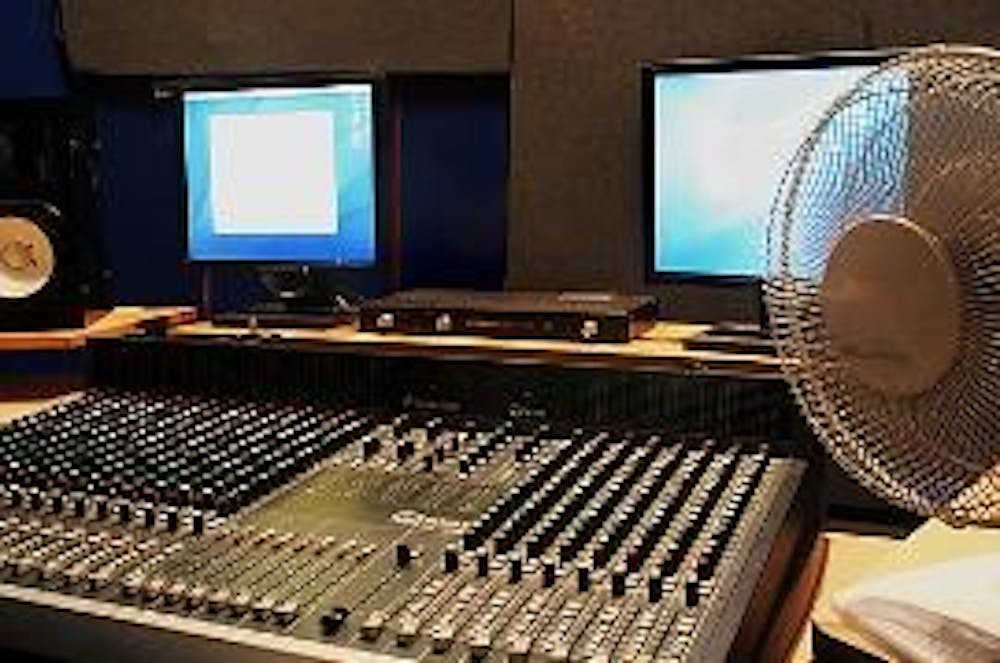Imagine a chemistry lab where students share only one Bunsen burner. The classroom has no chairs and isn't big enough for the whole class, so several students stand outside in the hallway. Students coax the outdated Bunsen burner to work to complete their assignments, and the temperature of the classroom rests at a sweltering 87 degrees.
AU's Audio Technology Program, also known as A-Tec, deals with these conditions on a daily basis, but instead of a chemistry classroom and one Bunsen burner, it's a cramped recording space and students are forced to share one large mixing console.
A-Tec has numerous successful alumni, including a four-time Grammy-winning sound engineer who works with the likes of Regina Spektor, a group of world-touring artists and Discovery Channel sound magicians. Though lauded by faculty and students as a strong, dynamic program featuring exceptional work ethics, a sense of community and strong talent, many in A-Tec have expressed their dissatisfaction with the lack of support and funding from the College of Arts and Sciences.
The control room is the main source of contention among students. The 13-foot-by-20-foot classroom, which some students call the "room of doom," is vital to all things A-Tec. But the casual observer would never guess its significance to the program.
It's not as simple as a new recording environment, however. Kay Mussell, dean of CAS, said the college couldn't address the issue of space because of plans to move the School of Communication into McKinley, which means A-Tec, as well as the other programs residing there, will need new homes. Mussell did not give a time frame for when the move would happen.
'Room of doom'
Meanwhile, A-Tec students must deal with one working light in the existing control room. Problems with mice and extreme heat plague the space, which also lacks chairs and adequate room to accommodate the students, according to Mike Ellis, a senior in CAS. Laurie Adlington, a senior in CAS, said classes are sometimes 12 or 13 students, but in a room without chairs, students may "stand for three hours."
Farley Miller, a junior in CAS, said students also stand in the hallway when the mixing room is too crowded.
"It's probably the worst ventilated room on campus," Miller said.
Situated a few feet from the heating unit of McKinley, the mixing room's standard temperature hovers around 85 degrees without students inside. With running equipment and bodies present, it easily reaches the mid-90s, according to Matt Boerum, studio manager for the A-Tec program.
Sessions mixing songs can last eight hours, and working in such elevated temperatures for even two hours can "cause you to lose consciousness of hearing," Ellis said.
Mussell said she had heard of temperature issues in McKinley last fall, but thought it was an isolated incident. Mussell said she "certainly would want to know" about any further issues.
But students are still concerned with their education in the present.
"Despite the quality of the teaching and despite the countless hours that everybody puts into it, we're always walking out with projects that sound subpar because our facilities are in horrible shape or because we have lackluster gear," Miller said.
He said the only thing the program needs is more funding to purchase space for additional studios, better working conditions and professional equipment. Miller said some students even venture into Virginia, to professor Michael Harvey's studio to complete projects because of the difficult working conditions in McKinley.
Working on a solution
CAS and A-Tec staff say there are ongoing talks on how to best deal with student complaints.
"There are discussions taking place on how to address the issue," Mussell said. "In the meantime, the CAS has upgraded the equipment."
Paul Oehlers, assistant professor of audio technology, said he submitted a proposal to Mussell detailing his recommendations to improve the A-Tec facilities, which she passed on to interim provost Ivy Broder.
"Dean Mussell also has authorized the purchase of mics and amps that are being used in classes this semester, and she has been supportive of the needs of the program," he said.
The proposal compared AU's program to other schools and discussed what other universities had done.
A-Tec professor John Fishell, who previously worked at Middle Tennessee State University, has firsthand knowledge of how AU's program compares. Fishell acknowledged MTSU's superior facilities, but also said the doubling of A-Tec majors from 30 to 60 students in four years showed that AU's program had something unique.
"You should hear some of their work given what they have to work with," said Fishell who praised the students for their dedication. "The students here are smart and motivated. It'd be nice to help them out a little more, make it easier for them. I don't want to sell the technology short, because it's important, but technology won't help a person be a good person."
Students have found their own ways to overcome the challenges. Though not ideal for the kind of computer work necessary for certain projects, two computer labs in Katzen have up-to-date software so students can maximize their limited time in the mixing room, according to Fishell.
Miller spent $3,000 on a computer that would give him the tools he needed to work on projects when not able to use the studio, though he said he felt that shouldn't be necessary when the money he spent in tuition was already significant.
Miller also said he hoped to make A-Tec's presence more recognized on campus.
"Nobody knows about any of this stuff," he said. "I'm friends with a lot of musicians at AU, and even they're startled when I'm like, 'There's a recording studio in McKinley.' We keep telling them we're real, but I don't know why nobody believes us"





